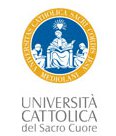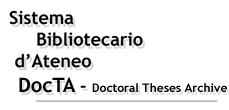|
|
DocTA - Doctoral Theses Archive >
Tesi di dottorato >
CORSO DI DOTTORATO IN SCIENZE LINGUISTICHE E LETTERARIE >
Citazione:
Utilizza queste indicazioni per citare o creare un link a questo documento.
|
Ovchinnikova, Elena. "LINGUISTIC PROXIMITY AND FOREIGN LANGUAGE SKILLS AS DRIVERS OF INTERNATIONAL STUDENT MOBILITY", Università Cattolica del Sacro Cuore, XXXIV ciclo, a.a. 2021/22, Milano, [http://hdl.handle.net/10280/161114].
|
| Titolo: | LINGUISTIC PROXIMITY AND FOREIGN LANGUAGE SKILLS AS DRIVERS OF INTERNATIONAL STUDENT MOBILITY |
| Autore/i: | OVCHINNIKOVA, ELENA |
| Tutor: | JONES, ELSPETH |
| Coordinatore: | MISSAGLIA, FEDERICA |
| Lingua: | ENG |
| Abstract in italiano della tesi: | La mobilità internazionale degli studenti è aumentata costantemente negli ultimi vent'anni,
così come il numero di studi che analizzano i fattori che influenzano il processo decisionale e
le scelte di destinazione degli studenti internazionali. Il ruolo della lingua è stato
riconosciuto come una forza trainante nelle scelte educative degli studenti internazionali a
livello macro e micro. Gli studi a livello macro, incentrati sui Paesi piuttosto che sugli
individui, si sono occupati in larga misura delle lingue condivise e più diffuse. Mentre
l'indagine sulla lingua vista dagli individui come risultato desiderato dei programmi di studio
all'estero è stato l'interesse principale degli studi a livello micro. Questa tesi si propone di
approfondire il ruolo della lingua come fattore macro e micro nel dirigere la mobilità
internazionale degli studenti, in primo luogo concentrandosi sull'influenza della vicinanza
linguistica sui flussi di studenti internazionali per i programmi di laurea/diploma completi e,
in secondo luogo, analizzando come le competenze linguistiche individuali influiscano sulle
aspirazioni di studio all'estero a breve termine degli studenti e sulle scelte di destinazione.
I risultati a livello macro dimostrano che la vicinanza linguistica gioca un ruolo importante
nel guidare i flussi di studenti internazionali. I risultati a livello micro indicano, a loro volta,
che gli studenti che valutano le loro competenze linguistiche come avanzate e che parlano
una lingua straniera quotidianamente hanno maggiori probabilità di aspirare a studiare
all'estero rispetto agli studenti che valutano le loro competenze a un livello intermedio e
che usano una lingua straniera settimanalmente o mensilmente. Il numero di lingue
straniere che gli studenti padroneggiano non sembra avere un impatto sulle decisioni degli
studenti di partecipare a programmi di studio all'estero. I risultati rivelano anche che gli
studenti che hanno deciso di partecipare a programmi di studio all'estero scelgono i Paesi
con una lingua ufficiale che conoscono.
Concentrandosi sull'influenza della lingua a livello macro e micro sulla mobilità degli
studenti internazionali, la tesi non solo migliora la nostra comprensione di come la lingua
influisca sul processo decisionale e sulle scelte di destinazione di uno studente
internazionale, ma suggerisce anche un modo per pensare a come questi due livelli possano
essere interconnessi. Complessivamente, la tesi sottolinea la necessità di ulteriori ricerche
sul legame tra macro e micro fattori linguistici nella mobilità internazionale degli studenti. |
| Abstract in inglese: | International student mobility has been steadily increasing over the last twenty years. So
have the number of studies analysing the factors influencing decision-making and destination
choices of international students. The role of language has been recognised as a driving force in
international students’ educational choices at both macro and micro levels. Macro level studies,
focused on countries rather than individuals, have largely addressed shared and most popular
languages. Whereas investigating language seen by individuals as a desired outcome of study
abroad programmes has been the main interest of micro level studies. This thesis aims to expand
on the role of language as both a macro and micro factor in directing international student
mobility first by focusing on the influence of language proximity on international student flows
for full degree/diploma programmes, and second by analysing how individual foreign language
skills impact students’ short-term study abroad aspirations and destination choices.
The macro-level results demonstrate that language proximity does play an important role
in driving international student flows. The micro-level findings, in turn, indicate that students
who evaluate their foreign language skills as advanced and who speak a foreign language on a
daily basis are more likely to aspire to study abroad in comparison to students who assess their
skills at an intermediate level and use a foreign language weekly or monthly. The number of
foreign languages students master does not seem to impact students’ decision-making for joining
study abroad programmes. The findings also reveal that students who have decided to participate
in study abroad programmes choose the countries with an official language they have knowledge
of.
By focusing on both macro and micro level influence of language on international student
mobility, the thesis does not only improve our understanding of how language impacts an
international student’s decision-making and destination choices, but also suggests a way to think
about how these two levels can interrelate. Altogether, the thesis stresses the need for further
2
research into the link between macro and micro language related factors in international student
mobility. |
| Data di discussione: | 23-mag-2023 |
| URI: | http://hdl.handle.net/10280/161114 |
| È visualizzato nelle collezioni: | FACOLTA' DI SCIENZE LINGUISTICHE E LETTERATURE STRANIERE
CORSO DI DOTTORATO IN SCIENZE LINGUISTICHE E LETTERARIE
|
File in questo documento:
| File |
Dimensioni | Formato | Accessibilità |
|---|
| Linguistic Prox_ Foreign_Lang_ Skills_Drivers_Intern_StudentMobility.pdf | 35,45 MB | Adobe PDF | Visualizza/apri
|
|
Accesso e utilizzo dei contenuti di DocTA
|



